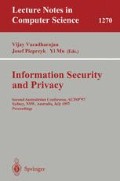Abstract
We show how to use cyclotomic polynomials to construct subgroups of multiplicative groups of finite fields that allow very efficient implementation of discrete logarithm based public key cryptosystems. Depending on the type of application and implementation, the resulting schemes may be up to three times faster than the fastest known schemes of comparable security that use more conventional choices of subgroups or finite fields.
Preview
Unable to display preview. Download preview PDF.
References
M. Adleman, J. DeMarrais, A subexponential algorithm for discrete logarithms over all finite fields, Proceedings Crypto'93, Lecture Notes in Comp. Sci. 773. 147–158 (1994).
G. Agnew, R.C. Mullin, I.M. Onyszchuk, S.A. Vanstone, An implementation for a fast public-key cryptosystem, Journal of Cryptology, 3, 63–79 (1991).
T. ElGamal, A public key cryptosystem and a signature scheme based on discrete logarithms, IEEE Transactions on Information Theory, 31, 469–472 (1985).
S. Gao, H.W. Lenstra, Jr., Optimal normal bases, Designs, Codes and Cryptography, 2, 315–323 (1992).
D.E. Knuth, The art of computer programming, volume 2, Seminumerical algorithms, second edition, Addison-Wesley, Reading, Massachusetts, 1981.
D.W. Kravitz, Digital signature algorithm, U.S. Patent # 5,231,668, 27 Jul 1993.
A.K. Lenstra, H.W. Lenstra, Jr., Algorithms in number theory, J. van Leeuwen, editor, Handbook of Theoretical Computer Science, 674–715, Elsevier Science Publishers, 1990.
P.L. Montgomery, Modular multiplication without trial division, Math. Comp., 44, 519–521 (1985).
R.C. Mullin, I.M. Onyszchuk, S.A. Vanstone, R.M. Wilson, Optimal normal bases in GF(p n), Discrete Appl. Math., 22, 149–161 (1988/89).
H. Riesel, Prime numbers and computer methods for factorization, Birkhäuser, 1985.
O. Schirokauer, Using number fields to compute logarithms in finite fields, to appear.
O. Schirokauer, D. Weber, T. Denny, Discrete logarithms: the effectiveness of the index calculus method, H. Cohen, editor, Preproceedings ANTS II, Algorithmic number theory symposium, 327–351, Université de Bordeaux I, 1996.
C.P. Schnorr, Efficient signature generation by smart cards, Journal of Cryptology, 4, 161–174 (1991).
Author information
Authors and Affiliations
Editor information
Rights and permissions
Copyright information
© 1997 Springer-Verlag Berlin Heidelberg
About this paper
Cite this paper
Lenstra, A.K. (1997). Using cyclotomic polynomials to construct efficient discrete logarithm cryptosystems over finite fields. In: Varadharajan, V., Pieprzyk, J., Mu, Y. (eds) Information Security and Privacy. ACISP 1997. Lecture Notes in Computer Science, vol 1270. Springer, Berlin, Heidelberg. https://doi.org/10.1007/BFb0027920
Download citation
DOI: https://doi.org/10.1007/BFb0027920
Published:
Publisher Name: Springer, Berlin, Heidelberg
Print ISBN: 978-3-540-63232-0
Online ISBN: 978-3-540-69237-9
eBook Packages: Springer Book Archive

